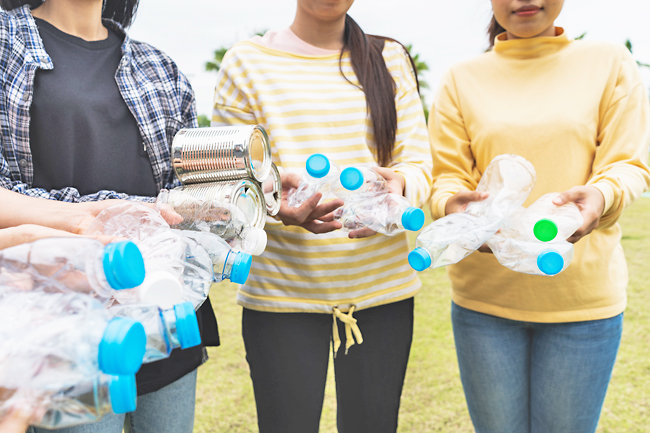The ASEAN region stands to lose much in natural wealth if nothing is done about the threat of single-use plastics. Yet the region is expected to increases increase its solid waste generation by 140 per cent – from 0.76 million tonnes per day in 2000 to 1.8 million tonnes per day in 2025.
With this reality on the horizon, how can plastic pollution be minimised, or at best, eliminated in ASEAN? This was the question posed by Executive Director at the ASEAN Centre for Biodiversity (ACB) Dr Theresa Mundita S Lim in a recent press statement for Earth Day.
“For every minute, one truckload of plastic waste is being dumped into the oceans which is about 80 million tonnes of plastic waste every year.
“If unabated, this will cause oceans to have more plastic than fish by the year 2050, and about 99 per cent of seabirds will have ingested plastics by then.”
Citing a report by the Intergovernmental Science-Policy Platform on Biodiversity and Ecosystem Services, Dr Lim highlighted how plastic pollution in the ASEAN region has increased tenfold since 1980.
A concerning fact, she noted, considering Southeast Asia accounts for about 20 per cent of the global plastic production.
As a result, marine species and ecosystems bear the brunt as plastic wastes are carried from land to the ocean by inland waters that connect them.
As the impending environmental crisis threatens our future, Dr Lim outlined several initiatives and strategies for the regional bloc to combat the grim reality of plastic pollution.
A crucial first step is to establish a unified ASEAN stance on plastic waste, promoting a ‘One ASEAN vs Plastics initiative’ while advocating for biodiversity-friendly and nature-based solutions.


ONE ASEAN VERSUS PLASTICS
“Undoubtedly, beating plastic pollution is a daunting yet necessary task to ensure the future and wellbeing of the people in ASEAN,” continued Dr Lim.
Despite this, the executive director is optimistic that the region’s rapid economic growth and commitment to sustainable development provide the capability to tackle this global challenge.
The Bangkok Declaration on Combating Marine Debris in the ASEAN region, adopted in 2019, is a key response to pollution, including plastic waste.
In 2021, the ASEAN member states (AMS) launched the Regional Action Plan for Combating Marine Debris, a five-year initiative focused on reducing plastic use, improving recycling, and promoting reuse.
The ASEAN also issued the ASEAN Guidelines on Green Meetings in 2020, urging AMS and organisations to adopt eco-friendly practices in events.
Meanwhile during the 43rd ASEAN Summit in 2023, the ASEAN Blue Economy Framework was introduced to enhance cross-border cooperation on plastic pollution.
The summit also saw the launch of the ASEAN Business and Biodiversity Initiative (ABBI), a partnership between the ACB and the ASEAN Business Advisory Council (ABAC). ABBI aims to promote nature-positive business practices, including reducing plastic production and improving waste management.
“Furthermore, the ACB and the AMS are currently crafting the regional biodiversity action plan or the ‘ASEAN Biodiversity Plan,’ which would help translate the targets and objectives of the Kunming-Montreal Global Biodiversity Framework into strategic actions.”
STRENGTHENING NATIONAL POLICIES
Another avenue brought forth by Dr Lim in mitigating the region’s plastic pollution is by advancing policy frameworks and regulations at the national level, including sustained nationwide communication and public awareness campaigns and programmes. At present, AMS have diverse national policies on plastic pollution. These efforts are being harmonised with the revision of each country’s National Biodiversity Strategies and Action Plans to align with global and regional biodiversity goals, including solutions for plastic waste.
Brunei initiated the No Plastic Bag Everyday initiative, aiming for a 15 per cent recycling rate by 2020. About 50 stores participated, saving USD2,000 per month through reduced plastic use.
Indonesia, Malaysia and Myanmar have taken steps such as banning or taxing plastic bags.
Thailand plans to ban single-use plastics by 2022 and cups and straws by 2025. Cambodia, Laos, and the Philippines promote the Bring Your Own Bag scheme, while Vietnam’s businesses offer eco-friendly bags and the government taxes plastic bags at USD1.76 per kilogramme.
Meanwhile, Singapore aims to be a Zero Waste Nation, incinerating almost all non-recyclable waste and shipping the ash to a nature reserve island.
The island-state’s Resource Sustainability Bill also mandates a system for nationwide reuse and recycling, including a reporting framework for packaging initiated in 2020.
Through this bill, enterprises were required to report annually on the type and amount of packaging materials they bring into the market as well as their packaging waste reduction plans.
Dr Lim went on to emphasise the importance of nationwide communication and public awareness campaigns to complement national policies and translate leaders’ statements and regional frameworks into action.
In 2019, the ACB launched the ‘Oceans are Fitter without Our Litter’ campaign to strengthen its commitment to AMS in combating plastic pollution, as outlined in the Bangkok Declaration on Combating Marine Debris in the ASEAN region.
“Campaigns help continuously educate the public on the effects of plastics to the environment and help drive transformative change at the institutional level,” she said.
ENCOURAGING COMMUNITY AND INDIVIDUAL ACTIONS
Given the complexity of the global plastic problem, every small effort is significant, requiring multi-stakeholder participation, continued Dr Lim.
The World Economic Forum in 2022 highlighted the creative initiatives and social enterprises that have emerged within ASEAN region, such as Bye-Bye Plastic Bags, Plastic Tides Philippines, Second Life, and Octopus, have emerged.
These efforts, highlighted by the World Economic Forum in 2023, include beach clean-ups, public awareness campaigns, the use of artificial intelligence for waste collection, and supporting waste pickers’ wellbeing. These initiatives address environmental, economic, and social aspects of plastic pollution.
“With a whole-of-society approach coupled with sound regional frameworks, science-based and creative national policies, and adaptable solutions fit to the multicultural communities in ASEAN, beating the plastic problem in the region is never impossible.” – Wardi Wasil




